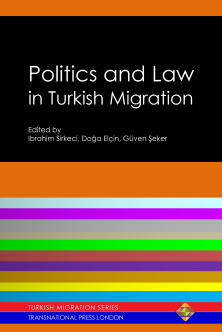Can Turks be Germans? - Symbolic Boundary Perception of Turkish Residents in Germany
Can Turks be Germans? - Symbolic Boundary Perception of Turkish Residents in Germany
Author(s): Nils Witte
Subject(s): Politics, Geography, Regional studies, Migration Studies, Inter-Ethnic Relations, Politics and Identity, Identity of Collectives
Published by: Transnational Press London
Keywords: Turkey; Germany; ethnic identity; symbolic boundary; Turkish residents; immigrants;
Summary/Abstract: This paper deals with immigrants’ perceived exclusion as an aspect of their naturalization intention. It demonstrates how immigrants perceive exclusion in different ways. The analysis draws on 13 in-depth interviews with Turkish permanent residents in the German city-state of Hamburg. The interviews were conducted as part of a mixed-methods study that investigates the role of symbolic boundaries in naturalization intentions of Turkish residents in Germany. The case of Turkish residents is relevant because they constitute the largest group of resident aliens in Germany (22% of foreign pop.) (Statistisches Bundesamt, 2013a) and their naturalization rate is low compared to other third-country nationals. Their annual naturalization rate was barely 5% in the last 20 years, although the majority is eligible for German citizenship (Statistisches Bundesamt, 2013b). Finally, the requirement to renounce their former passport makes an examination of symbolic aspects of citizenship particularly interesting.
Book: Politics and Law in Turkish Migration
- Page Range: 105-117
- Page Count: 13
- Publication Year: 2015
- Language: English
- Content File-PDF

